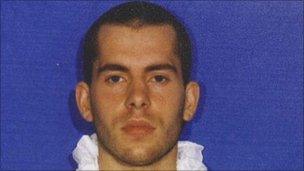Nail bomber David Copeland loses sentence appeal
- Published

Copeland admitted killing three and injuring 139 people in 1999
Nail bomber David Copeland has failed in his bid to reduce his minimum jail term of 50 years.
Copeland was given six life sentences in June 2000 for three counts of murder and three counts of causing explosions in London in order to endanger life.
Copeland, 35, from Hampshire, admitted killing three and injuring 139 people.
Under new legislation, a High Court judge set a minimum term of 50 years and the Court of Appeal upheld that sentence on Tuesday.
The original recommendation in his case was that he should serve a minimum of 30 years before he can be considered for parole.
Multiple murder
But High Court judge Mr Justice Burton later described it as a "really exceptional case of deliberate, multiple murder".
During 13 days in April 1999 Copeland caused explosions in Brixton, south London Brick Lane in east London and Soho, central London.
The final blast at the gay pub the Admiral Duncan killed Andrea Dykes, 27, who was pregnant, and friends John Light, 32, and Nik Moore, 31, from Essex.
Copeland intended his bombing campaign to ignite a race war across Britain, his trial heard.
He was tried at the Old Bailey in 2000 for murder after the prosecution refused to accept his plea of guilty to manslaughter on the grounds that he was suffering a mental illness - paranoid schizophrenia.
A Broadmoor Hospital consultant had described him as psychotic and diagnosed schizophrenia.
The original trial judge, Michael Hyam, concluded that Copeland's crimes were motivated by his hatred of black and Asian people and homosexuals.